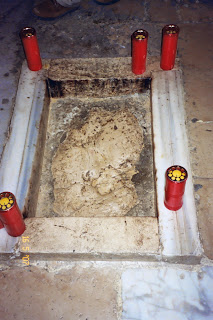Immaculate Conception of the Blessed Virgin Mary
This prayer, then, connects the Old and the New Testaments. Certainly, St. Elizabeth also echoes the words of Judith, but in Judith we see prefigured Mary, the beautiful one who attacks, not the general of a foreign army, but the leader of the ancient rebellion, the devil. Judith kills Holofernes by cutting off his head. This connects to the Blessed Mother, the new Eve, through the words God speaks in Genesis, chapter 3: “‘I will put enmity between you and the woman, and between your offspring and hers; They will strike at your head.” Our Blessed Mother in her immaculate conception is depicted as a woman standing with a snake under her feet. How do you kill a snake? You cut off its head.
God, from all eternity, prepared the world and His People for this great gift that He gave to the Blessed Mother. He began in Genesis, as I just mentioned, and then continued through the Book of Judith to tell us of a woman who would strike at the head of our enemy. This woman would be blessed by God above all the women on the earth, the woman who is the glory of Jerusalem and the pride of Israel. No other woman can claim such a high honor, and in the church, while we don’t worship the Mother of God, we give her more honor than any of the other saints. We give the saints dulia or honor (the English word “adulation,” is connected to dulia). We give to the Blessed Mother hyperdulia, or above-ordinary honor.
Some would claim that our celebration of her immaculate conception removes the Blessed Mother from humanity, and therefore makes her not truly human. And at first glance, one can understand the confusion. After all, if the Blessed Virgin Mary was not conceived with sin, how can she truly by the highest honor of our race, since all of us are born with original sin? How can she be a model for us when her beginning was so unlike ours?
Yes, our Blessed Mother received a gift whereby she was more like Eve at her creation from the side of Adam than like Judith. God created Eve (and Adam before her) without original sin. And yet, Eve, though she had no sin, still disobeyed God (and Adam after her). Eve had the power to choose good or choose evil, a power she used poorly when tempted by the devil. The Theotokos also had the power to choose good or choose evil, but she used this power well, never disobeying God, never giving in to Satan’s wiles. The first Eve’s disobedience found healing in the second Eve’s lifelong obedience. But both the first Eve and the new Eve were fully human, though both entered the world without any sin on their soul. And just as we call Adam and Eve our first parents, though they did not originally have sin at their creation, so we rightly affirm that the Blessed Virgin Mary, even with the prevenient grace of the immaculate conception, was one of us, not a tertium quid, a third thing between God and man.
And this great gift makes sense for the one who would agree to be the Mother of Jesus Christ, our Lord and God. God is pure holiness, and no sin can exist in His presence, any more than darkness can exist in the direct light of the sun. So if our Blessed Mother had even just original sin, when our Lord took flesh in her womb at the Annunciation, it would have destroyed the Blessed Mother. It is as St. Paul wrote in his second epistle to the Corinthians: “what fellowship does light have with darkness? …What agreement as the temple of God with idols?” The Mother of God had to be pure because light has no fellowship with darkness, and the temple of the incarnate God could not exist in the same place as idolatry, the worship of the false god of pride. And in this sense, we return to the Gospel, in which the Archangel Gabriel refers to Mary as “full of grace.” How could the messenger of salvation refer to her as full of grace if there were any sin in her at all?
Our Blessed Mother is truly a warrior queen who, united to her Divine Son, conquers the ancient enemy, the devil. She strikes at the head of the ancient serpent to kill it, by being obedient to God and cooperating in the work of our salvation. May we honor with lives lived in obedience to God, as best as we can, the highest honor of our race, the glory of Jerusalem, the woman blessed above all the women of the earth, the Blessed Virgin Mary, who gave birth to the eternal redeemer, Jesus Christ, who with the Father and the Holy Spirit live and reign for ever and ever. Amen.

.jpg)




